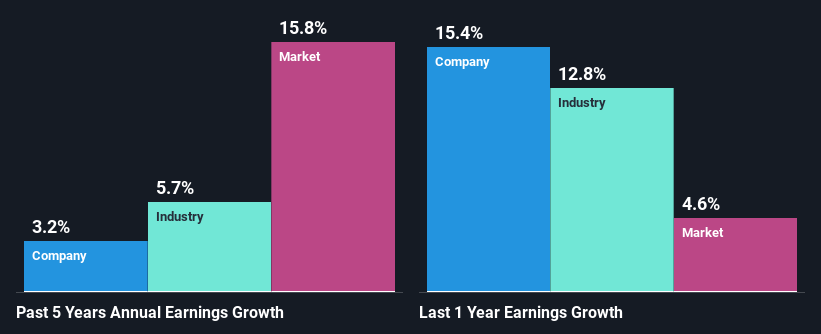Moog Inc.'s (NYSE:MOG.A) Stock Is Going Strong: Have Financials A Role To Play?
Most readers would already be aware that Moog's (NYSE:MOG.A) stock increased significantly by 11% over the past three months. As most would know, fundamentals are what usually guide market price movements over the long-term, so we decided to look at the company's key financial indicators today to determine if they have any role to play in the recent price movement. Specifically, we decided to study Moog's ROE in this article.
Return on Equity or ROE is a test of how effectively a company is growing its value and managing investors’ money. Put another way, it reveals the company's success at turning shareholder investments into profits.
View our latest analysis for Moog
How To Calculate Return On Equity?
Return on equity can be calculated by using the formula:
Return on Equity = Net Profit (from continuing operations) ÷ Shareholders' Equity
So, based on the above formula, the ROE for Moog is:
11% = US$169m ÷ US$1.6b (Based on the trailing twelve months to April 2023).
The 'return' is the amount earned after tax over the last twelve months. So, this means that for every $1 of its shareholder's investments, the company generates a profit of $0.11.
What Has ROE Got To Do With Earnings Growth?
We have already established that ROE serves as an efficient profit-generating gauge for a company's future earnings. Depending on how much of these profits the company reinvests or "retains", and how effectively it does so, we are then able to assess a company’s earnings growth potential. Generally speaking, other things being equal, firms with a high return on equity and profit retention, have a higher growth rate than firms that don’t share these attributes.
A Side By Side comparison of Moog's Earnings Growth And 11% ROE
At first glance, Moog seems to have a decent ROE. Even when compared to the industry average of 12% the company's ROE looks quite decent. Despite the modest returns, Moog's five year net income growth was quite low, averaging at only 3.2%. We reckon that a low growth, when returns are moderate could be the result of certain circumstances like low earnings retention or poor allocation of capital.
Next, on comparing with the industry net income growth, we found that Moog's reported growth was lower than the industry growth of 5.7% over the last few years, which is not something we like to see.
The basis for attaching value to a company is, to a great extent, tied to its earnings growth. The investor should try to establish if the expected growth or decline in earnings, whichever the case may be, is priced in. This then helps them determine if the stock is placed for a bright or bleak future. One good indicator of expected earnings growth is the P/E ratio which determines the price the market is willing to pay for a stock based on its earnings prospects. So, you may want to check if Moog is trading on a high P/E or a low P/E, relative to its industry.
Is Moog Making Efficient Use Of Its Profits?
Moog has a low three-year median payout ratio of 20% (meaning, the company keeps the remaining 80% of profits) which means that the company is retaining more of its earnings. However, the low earnings growth number doesn't reflect this fact. So there might be other factors at play here which could potentially be hampering growth. For example, the business has faced some headwinds.
Moreover, Moog has been paying dividends for five years, which is a considerable amount of time, suggesting that management must have perceived that the shareholders prefer dividends over earnings growth. Our latest analyst data shows that the future payout ratio of the company is expected to drop to 14% over the next three years. As a result, the expected drop in Moog's payout ratio explains the anticipated rise in the company's future ROE to 25%, over the same period.
Summary
Overall, we feel that Moog certainly does have some positive factors to consider. However, given the high ROE and high profit retention, we would expect the company to be delivering strong earnings growth, but that isn't the case here. This suggests that there might be some external threat to the business, that's hampering its growth. With that said, the latest industry analyst forecasts reveal that the company's earnings are expected to accelerate. Are these analysts expectations based on the broad expectations for the industry, or on the company's fundamentals? Click here to be taken to our analyst's forecasts page for the company.
Have feedback on this article? Concerned about the content? Get in touch with us directly. Alternatively, email editorial-team (at) simplywallst.com.
This article by Simply Wall St is general in nature. We provide commentary based on historical data and analyst forecasts only using an unbiased methodology and our articles are not intended to be financial advice. It does not constitute a recommendation to buy or sell any stock, and does not take account of your objectives, or your financial situation. We aim to bring you long-term focused analysis driven by fundamental data. Note that our analysis may not factor in the latest price-sensitive company announcements or qualitative material. Simply Wall St has no position in any stocks mentioned.
Join A Paid User Research Session
You’ll receive a US$30 Amazon Gift card for 1 hour of your time while helping us build better investing tools for the individual investors like yourself. Sign up here

